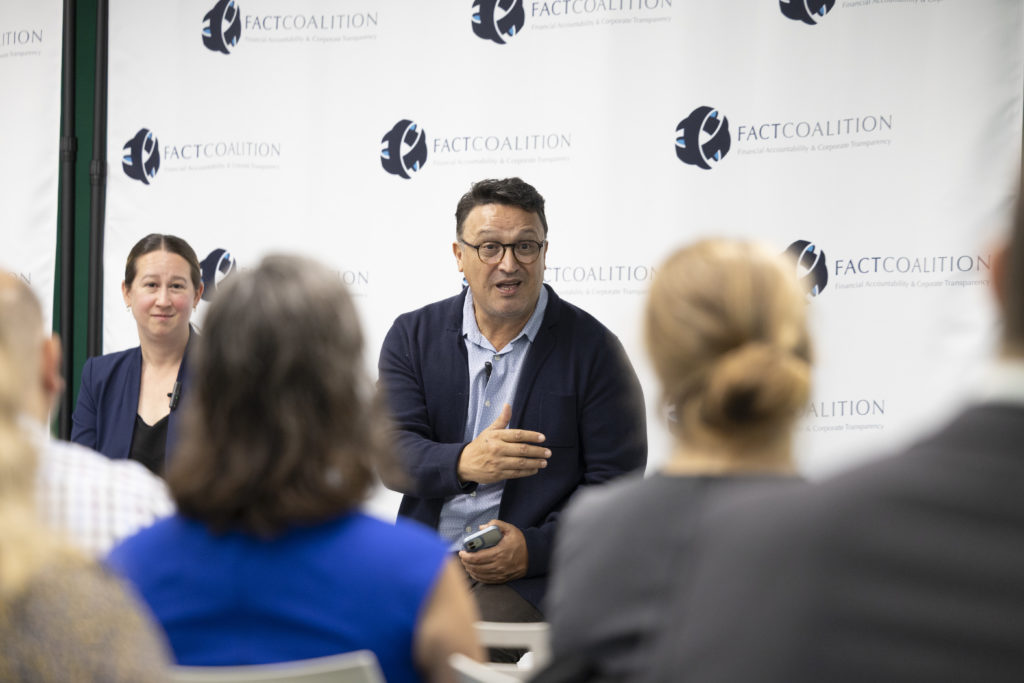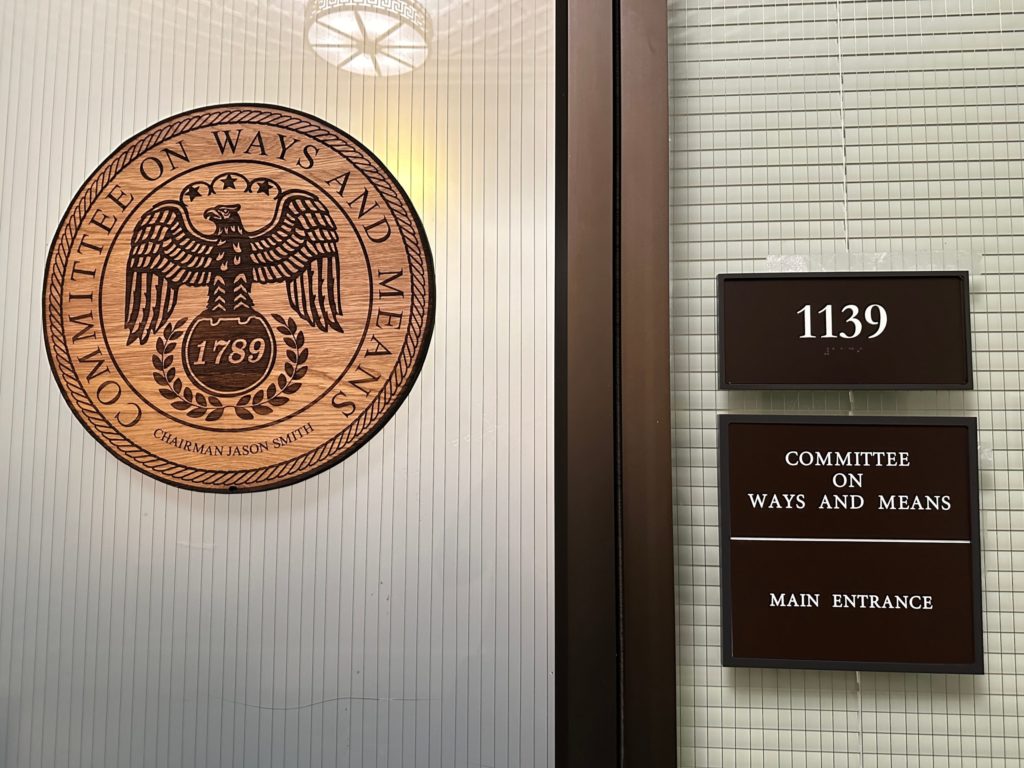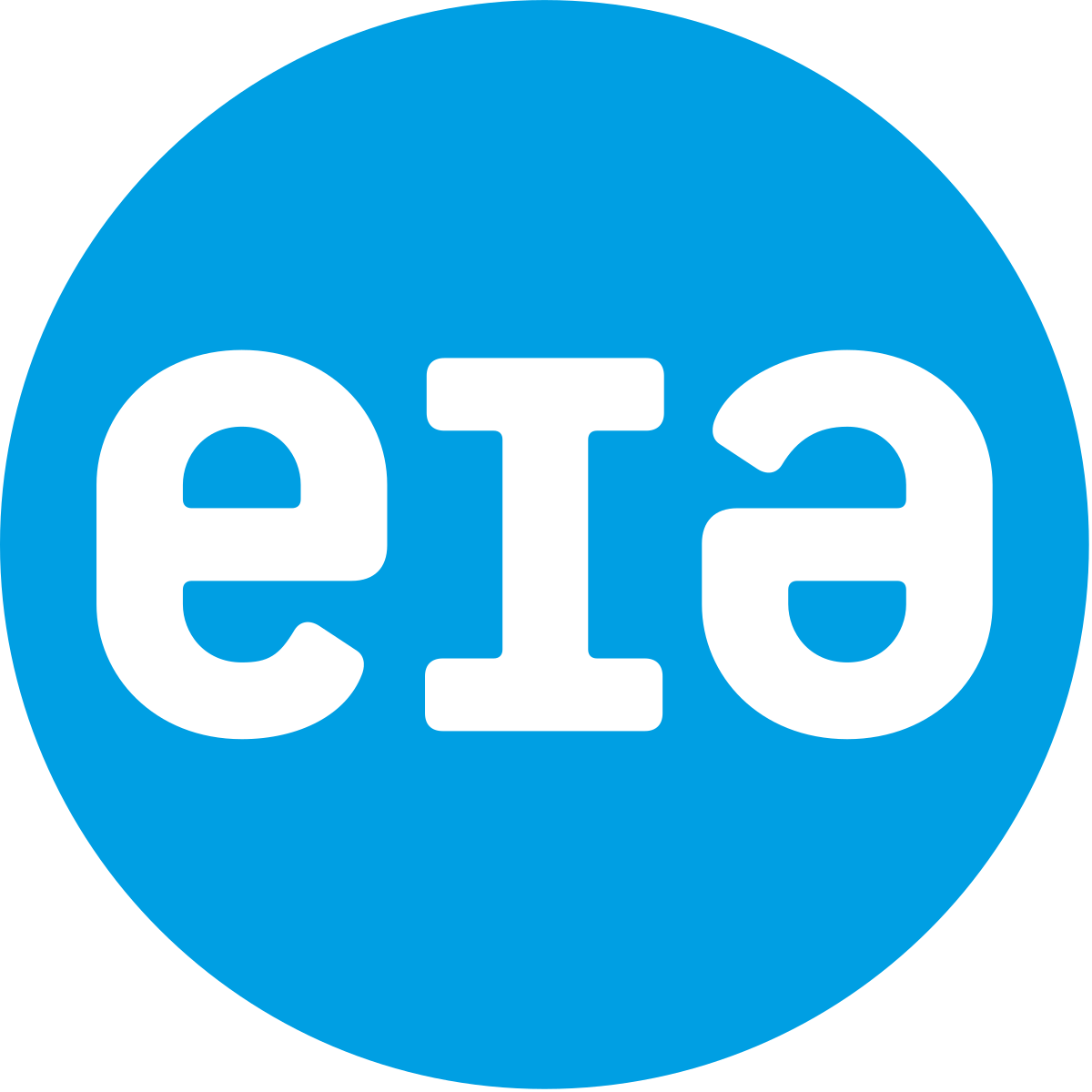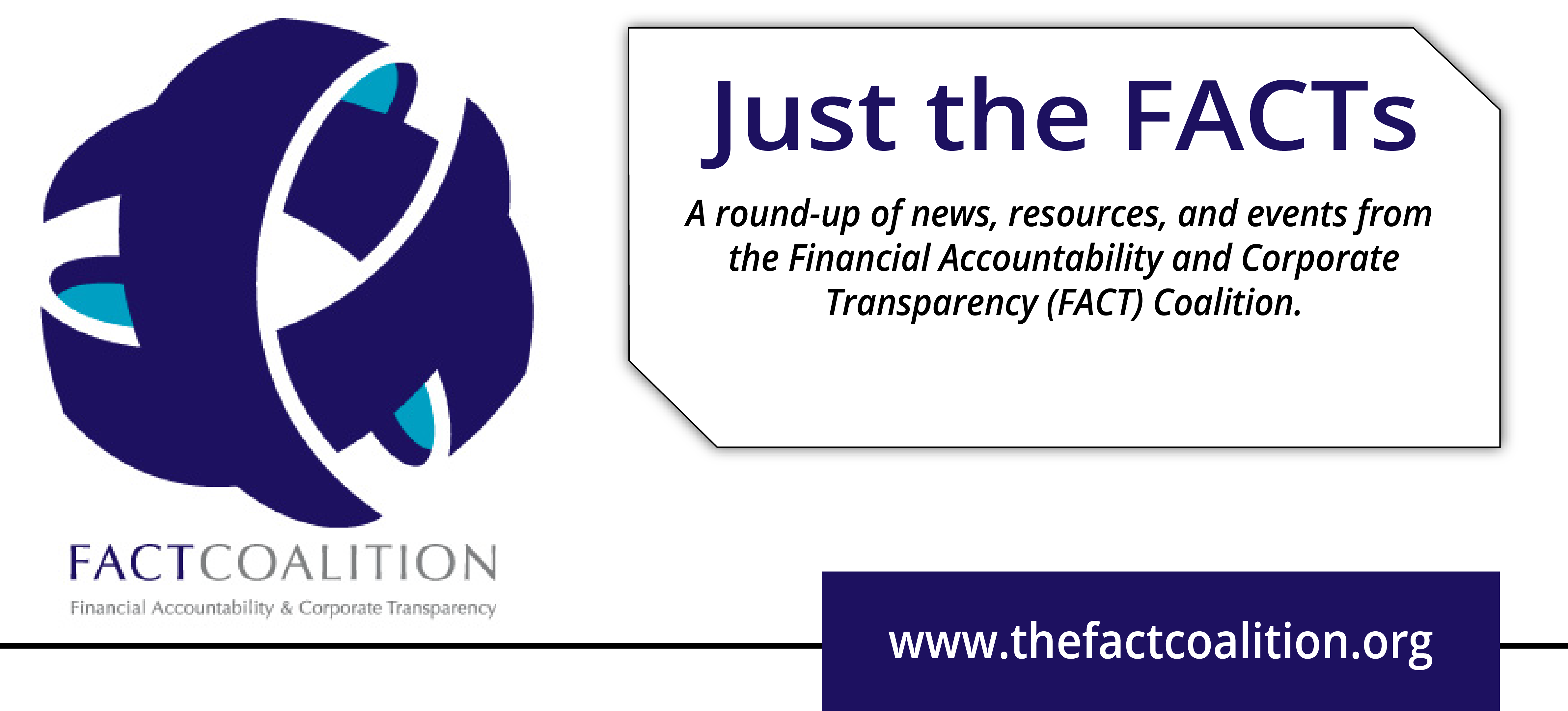“Just the FACTs” is a round-up of news stories and information regarding efforts to combat corrupt financial practices, including offshore tax haven abuses, corporate secrecy, and money laundering through the financial system.
Send feedback or items for future newsletters to Thomas Georges at tgeorges@thefactcoalition.org
State of Play

FACT Convenes Journalists, Experts for Discussion of Illegal Gold Mining in the Amazon and Connections to Transnational Illicit Financial Flows
On May 14, FACT hosted a discussion with two award-winning investigative journalists – Joseph Poliszuk, co-editor and co-founder of Armando.Info and Arturo Torres, director of Código Vidrio – on the impact of illicit gold mining in Venezuela and Ecuador, and the illicit networks that allow illegal gold and its proceeds to make their way across international borders. The event, titled Illegal Gold Mining and Dirty Money: Breaking the Vicious Cycle of Environmental Crime in the Americas, was moderated by Will Freeman of the Council on Foreign Relations, an expert on Latin America and the U.S.-Latin America relationship, and included commentary from FACT program director for environmental crime and illicit finance Julia Yansura.
Happening Now: FACT welcomes two award-winning journalists, @ArmandoInfo's @jopoliszuk and @CodigoVidrioEc's @Cascabelito09 for a conversation on illegal gold mining and illicit finance in the Western Hemisphere, moderated by @WillGFreeman with FACT's @JYansura. pic.twitter.com/Pq4donnJgY
— FACT Coalition (@FACTCoalition) May 14, 2025
Rising gold prices have supercharged the metal’s role in the illicit economy in recent years, becoming, in the words of Will Freeman, “the hidden financial engine of organized crime and authoritarian regimes.” According to Arturo Torres, illegal gold is a consistent through-line connecting a wide range of illicit activity, including narcotics and arms trafficking.

Despite the challenges of tackling illegal gold networks, there are also opportunities for investigators and prosecutors, particularly when they follow the money. “What we’re seeing with these criminal organizations involved in environmental crime, and illegal gold mining, is that in a lot of cases the money is flowing across international borders,” said Julia Yansura. “And in a way, that’s an opportunity for us to go after it. Their weak spot is their love of bank accounts in foreign countries. Some of the countries involved aren’t going to stand for that.”
There is ample evidence that weaknesses in the U.S. anti-money laundering framework play a role in enabling these transnational criminals, including those committing environmental crimes in the Amazon. A recent FACT report on money laundering typologies linked to environmental crime found that anonymous shell and front companies are the most common vehicles used to enable and conceal the proceeds of environmental crimes committed in the Amazon region. Though the U.S. has moved to address some of these vulnerabilities in recent years, major setbacks under the current administration have threatened that progress.
Treasury to Receive Comments on Gutting of Landmark Ownership Transparency Law
Despite the centrality of beneficial ownership transparency to both U.S. and regional security, in March, the Trump administration announced that it would eviscerate the bipartisan Corporate Transparency Act (CTA), which requires companies formed or doing business in the U.S. to report limited information on their true owners to Treasury’s Financial Crimes Enforcement Network. On March 21, the U.S. Treasury issued an interim final rule exempting U.S. domestic companies and U.S. owners from reporting, reducing the total number of companies covered under the law from more than 32 million to under 12,000.
Though this reduced scope of coverage is now in effect, it remains subject to a standard notice and comment period for public feedback, and has been the subject of outcry from lawmakers, law enforcement, and other stakeholders that view Treasury’s interim final rule as a rejection of Congress’ intent in passing the CTA. Just last week, Gary Kalman, Executive Director of FACT-member Transparency International U.S., testified on the need for beneficial ownership data before the House Committee on Small Business, saying that “the exemption for domestic companies from the CTA is not consistent with a risk-based approach to countering financial crime.” During the hearing, numerous lawmakers asked questions or made comments in support of the CTA, including Reps. Velazquez, Scholten, Conaway, and Olszewski.
FACT and its allies plan to submit public comments on the interim final rule next week, highlighting the importance of beneficial ownership as a tool to combat tax evasion, drug smuggling, terror finance, and environmental crimes. Comments on the interim final rule are due May 27.

House Passes Massive Tax Cuts for the Wealthy and Big Business, Paid for By Medicaid and Climate Cuts
Early Thursday morning, the House passed a major budget bill, which includes trillions of dollars of new and extended tax cuts, partially offset by deep cuts to Medicaid, food stamps, and climate programs. An earlier version of the bill was projected to primarily reward wealthy individuals and large businesses.
The bill includes a number of provisions that benefit major multinational corporations, including permanent codification of reduced tax rates for certain export income and the foreign profits of American multinationals. These reduced rates substantially incentivise the offshoring of U.S. manufacturing, jobs, and profits.
The bill also includes a provision threatening severe retaliatory taxes on foreign companies and individuals based in countries that have implemented what the bill calls “unfair foreign taxes”, including elements of the OECD’s 2021 global tax agreement, as well as digital services taxes. These provisions would impose retaliatory taxes against many countries, including vital U.S. trading partners like all EU member states, Japan, Canada, and the UK. However, it is the U.S. economy that would likely bear the brunt of the provision’s impact through reduced foreign direct investment.
The House package also introduces new and expanded taxes on colleges and universities, private foundations, and other non-profits, threatening the financial wellbeing of key pillars of U.S. civil society. A measure that would have allowed Treasury to unilaterally revoke the tax-exempt status of non-profit groups by designating them “terrorist supporting organizations” was included in an initial bill recommended to the House by the Ways and Means Committee, but was ultimately removed before passage.
Latest from FACT

US Pharma Investors Deserve Transparency to Understand Tax Risks
Read FACT executive director Ian Gary’s new op-ed in Bloomberg Tax calling for greater tax transparency for U.S. multinationals in light of international developments and increasing investor support for public country-by-country reporting (CbCR).
Gary’s op-ed focuses particularly on the U.S. pharmaceutical giant Merck, which is facing a shareholder resolution calling for voluntary public CbCR in light of substantial tax-related risks in the pharma sector. That resolution goes to a vote during Merck’s annual shareholder meeting on May 27.
From the op-ed: “Merck’s shareholders—like others before them at Amazon.com Inc., Microsoft Corp., Cisco Systems, and other major US multinationals—are asking for more transparency around the company’s international tax practices…Such strategies may temporarily inflate the bottom lines of companies such as Merck, but they pose stark risks for investors over the longer term.”

FACT Environmental Crimes Newsletter: Spring 2025
Read the Spring 2025 edition of FACT’s Environmental Crimes Newsletter, which details efforts by FACT, our members and allies to combat environmental crimes and the dirty money associated with them.
In the Spring edition:
- Updates on the Corporate Transparency Act and U.S. Legal Gold and Mining Partnership Act, as well as recent program activities from FACT.
- FACT program director for environmental crime and illicit finance Julia Yansura’s recent op-ed on U.S. beneficial ownership transparency for OjoPúblico, a leading Peruvian investigative journalism source.
- FACT’s latest report, Money Laundering from Environmental Crime: Typologies and Trends in Countries in the Amazon Region.
- New reports and publications from members and allies, including World Wildlife Fund (WWF) UK, Código Vidrio, the Environmental Investigation Agency (EIA), and the Center for Amazonian Scientific Innovation (CINCIA).

A Deadly Gold Rush: How Soaring Prices Fuel Colombia’s Guerrilla Warfare
FACT policy fellow for environmental crime and illicit finance Isidoro Hazbun’s latest blog looks at the impact of rising gold prices on illegal mining in Colombia, where gold is increasingly seen by criminal factions as both a source of funding for weapons and a vehicle for cross-border investment.
From the blog: “In Colombia, criminal factions are locked in a violent battle over a hidden fortune. This treasure, a stockpile of gold once hoarded by the Revolutionary Armed Forces of Colombia (FARC) and now allegedly controlled by dissident commanders, is valued at 50 billion Colombian pesos (approximately $12 million USD). Originally invested in machinery and other assets, its soaring worth has transformed it into a powerful financial weapon, fueling guerrilla operations, arms procurement, and illicit activities.”

Comment: FACT Calls on Lawmakers to Restore and Protect Landmark Financial Transparency Law
Read FACT’s comments to the House Financial Services Committee ahead of this year’s annual testimony by the Treasury Secretary on the Corporate Transparency Act.
From the comment: “Despite clear evidence of the risks posed by anonymous shell companies to national security, law enforcement, U.S. consumers, and small businesses, on March 21 Treasury issued an interim final rule (IFR) exempting domestic entities – more than 99 percent of all entities originally covered under the CTA – from reporting requirements. This move flies in the face of more than 10 years of Treasury National Risk Assessments and Congress’ own findings, which make it clear that domestic anonymous entities represent a significant money laundering risk.”
FACT in the News

The Flip Side of the Gold Boom: – Organized Crime Turns to Gold
FACT program director for environmental crime and illicit finance Julia Yansura was quoted by Norwegian outlet E24 in their coverage of the relationship between the price of gold and the proliferation of organized crime.
“In Colombia, the relationship between illegal gold mining and non-state armed actors is particularly clear. The rising price of gold will make these groups richer, which will intensify conflict and violence.”

Feds Slash Landmark Law That Targeted Billions in Dirty Dollars
FACT deputy director Erica Hanichak was quoted in the Pittsburgh Post-Gazette’s coverage of the U.S Treasury’s decision to not enforce beneficial ownership information reporting requirements for U.S.-based entities.
“[Treasury] basically put a sign up that said the U.S. is open to dirty money. They’re no longer enforcing the Corporate Transparency Act for 99 percent of entities.”

Tax Breaks For Offshore Production Could Thwart Tariffs’ Goal
FACT policy director Zorka Milin spoke to Law360 about how the U.S. international tax code undermines the administration’s efforts to reshore manufacturing through tariffs and other tools.
“There’s a mismatch between the real underlying issue, which is tax-related, and then trying to attack that with a blunt trade policy tool.”
From Our Members and Allies

Letter of Opposition to Nomination of Billy Long for IRS Commissioner
This week, FACT joined more than 25 tax fairness, labor, and other civil society organizations on a letter strongly opposing the nomination of Billy Long for Internal Revenue Service (IRS) Commissioner. Mr. Long – who has no formal tax training or experience, and has repeatedly advocated for the dismantling of the IRS – is entirely unqualified to run the Service, and his nomination should be rejected.
From the letter: “Mr. Long’s lack of experience, involvement in influence peddling schemes, and support for destroying the institutions he now desires to lead are obvious disqualifications. Senators must search their conscience and reject this obviously inept individual to be IRS Commissioner. For all the above reasons we urge you to reject Mr. Long’s confirmation.”

Timber and Gold, Examples of Chaos
Rodrigo Botero, a leading environmental expert in Colombia, highlights the work of FACT Environmental Crimes Working Group member EIA on illegal lumber in his recent publication for FCDS. Both illegal logging and illegal gold mining, Botero argues, are rewarded by global demand for end products and thin regulatory oversight at both the source and destination-country levels.
“The most interesting thing about the system is that today there is an international market devouring hundreds of tons of illegal gold, which now funds irregular armies, pads the payrolls of corrupt officials, and drives pollution of water, soil, and forests, leaving thousands of people with increasing damage from the effects of mercury in their bodies. Gold is being traded in unprecedented quantities on the international market, and not a single ‘developed’ country raises concerns about its origins…”
Recent and Upcoming Events

May 28: Dictators and Dirty Money Live Podcast: Examining the Case of Bashar al-Assad
FACT deputy director Erica Hanichak will take part in a hybrid panel discussion in Oslo, Norway on May 28 analyzing the webs of illicit finance that helped prop up the Assad regime in Syria from 2011 to 2024, and how these dynamics can inform efforts to prevent funds from reaching other sanctioned authoritarian regimes.
About the FACT Coalition

